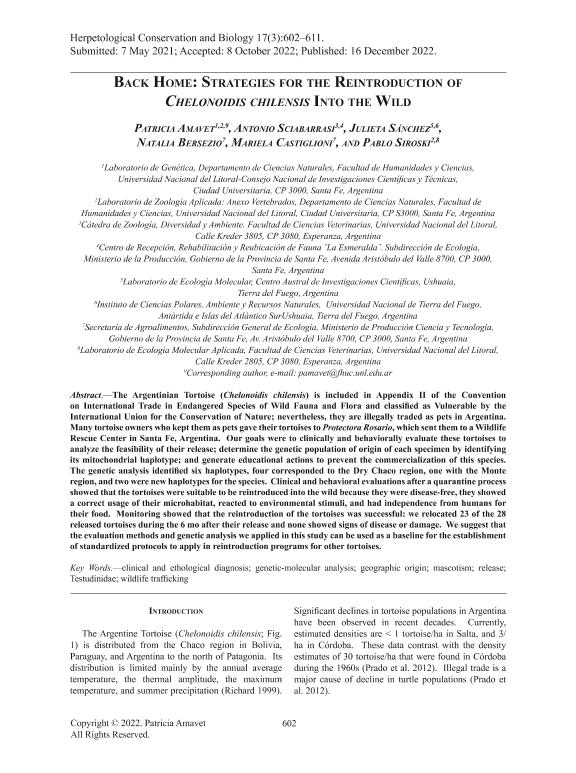Artículo
Back Home: Strategies for the Reintroduction of Chelonoidis chilensis Into the Wild
Amavet, Patricia Susana ; Sciabarrasi Bagilet, Antonio Alejandro; Sánchez, Julieta
; Sciabarrasi Bagilet, Antonio Alejandro; Sánchez, Julieta ; Bersezio, Natalia Soledad; Castiglioni, Mariela; Siroski, Pablo Ariel
; Bersezio, Natalia Soledad; Castiglioni, Mariela; Siroski, Pablo Ariel
 ; Sciabarrasi Bagilet, Antonio Alejandro; Sánchez, Julieta
; Sciabarrasi Bagilet, Antonio Alejandro; Sánchez, Julieta ; Bersezio, Natalia Soledad; Castiglioni, Mariela; Siroski, Pablo Ariel
; Bersezio, Natalia Soledad; Castiglioni, Mariela; Siroski, Pablo Ariel
Fecha de publicación:
12/2022
Editorial:
Herpetological Conservation and Biology
Revista:
Herpetological Conservation and Biology
e-ISSN:
1931-7603
Idioma:
Inglés
Tipo de recurso:
Artículo publicado
Clasificación temática:
Resumen
The Argentinian Tortoise (Chelonoidis chilensis) is included in Appendix II of the Convention on International Trade in Endangered Species of Wild Fauna and Flora and classified as Vulnerable by the International Union for the Conservation of Nature; nevertheless, they are illegally traded as pets in Argentina. Many tortoise owners who kept them as pets gave their tortoises to Protectora Rosario, which sent them to a Wildlife Rescue Center in Santa Fe, Argentina. Our goals were to clinically and behaviorally evaluate these tortoises to analyze the feasibility of their release; determine the genetic population of origin of each specimen by identifying its mitochondrial haplotype; and generate educational actions to prevent the commercialization of this species. The genetic analysis identified six haplotypes, four corresponded to the Dry Chaco region, one with the Monte region, and two were new haplotypes for the species. Clinical and behavioral evaluations after a quarantine process showed that the tortoises were suitable to be reintroduced into the wild because they were disease-free, they showed a correct usage of their microhabitat, reacted to environmental stimuli, and had independence from humans for their food. Monitoring showed that the reintroduction of the tortoises was successful: we relocated 23 of the 28 released tortoises during the 6 mo after their release and none showed signs of disease or damage. We suggest that the evaluation methods and genetic analysis we applied in this study can be used as a baseline for the establishment of standardized protocols to apply in reintroduction programs for other tortoises.
Archivos asociados
Licencia
Identificadores
Colecciones
Articulos(CADIC)
Articulos de CENTRO AUSTRAL DE INVESTIGACIONES CIENTIFICAS
Articulos de CENTRO AUSTRAL DE INVESTIGACIONES CIENTIFICAS
Articulos(CCT - SANTA FE)
Articulos de CTRO.CIENTIFICO TECNOL.CONICET - SANTA FE
Articulos de CTRO.CIENTIFICO TECNOL.CONICET - SANTA FE
Articulos(ICIVET-LITORAL)
Articulos de INST. DE CIENCIAS VETERINARIAS DEL LITORAL
Articulos de INST. DE CIENCIAS VETERINARIAS DEL LITORAL
Citación
Amavet, Patricia Susana; Sciabarrasi Bagilet, Antonio Alejandro; Sánchez, Julieta; Bersezio, Natalia Soledad; Castiglioni, Mariela; et al.; Back Home: Strategies for the Reintroduction of Chelonoidis chilensis Into the Wild; Herpetological Conservation and Biology; Herpetological Conservation and Biology; 17; 3; 12-2022; 602-611
Compartir



